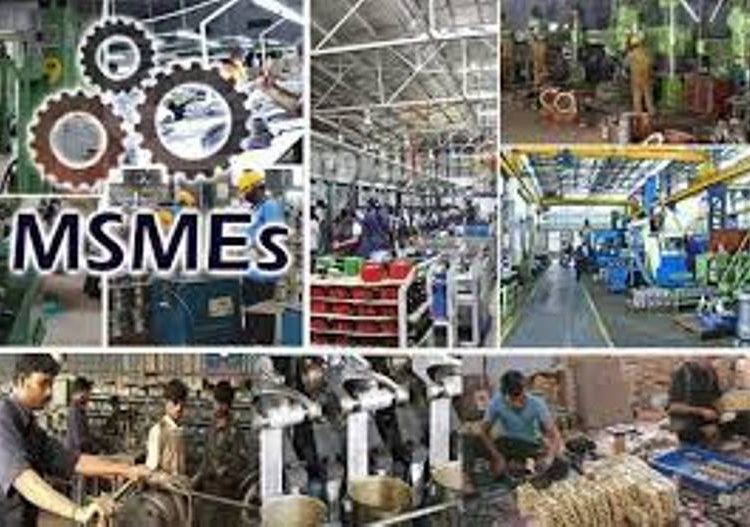By Olawunmi Ashafa
Since the attainment of independence 63 years ago, Nigeria has been battling with development issues, despite its natural endowment in human and material resources.
Several strategies by successive civilian and military administrations have met with limited successes.
Apparently, this position explains the recent gathering of stakeholders in Ilorin to brainstorm on the way forward to local production of the nation’s needs as against what some have described as present waste of foreign exchange on importation.
The forum was organised by one of the major stake-holding organisations in Nigeria’s business platforms – the Small and Medium Enterprises Development Agency of Nigeria (SMEDAN).
A former Director-General, Nigerian Association of Chambers of Commerce, Industry, Mines and Agriculture (NACCIMA), Amb. Ayoola Olukanni, was the guest lecturer at the SMEDAN retreat.
The retreat was organised for a stratum of the agency to diagnose the theme: ‘Enhancing the Institutional Capacity for Greater Impact on the Nigerian MSME Ecosystem’.
Olukanni, a diplomat with practical experiences around the world, did not mince word as he highlighted the reasons for Nigeria’s stunted growth since independence.
He noted that the topic for the discourse could not have been more relevant in the current economic landscape.
Before the discovery of crude oil in Oloibiri in the Niger Delta in the 1950s by Shell D’Arcy, after 50 years of unsuccessful exploration, the mainstay of the country’s economy was majorly agriculture showered with a few other natural resources that dotted various regions.
Apparently, due to the discovery of oil wells in the Delta area, the groundnut pyramid in Kano, coal deposit in Enugu and the natural endowments in Jos like columbite which dates back to the 1940s were sideline for the black gold.
The country has, however, continued to wallow in abject poverty despite development policy reforms in all sectors of human endeavour but which implementation have continued to draw down.
Experts recalled the woeful implementation of the Operation Feed the Nation, a strategy deployed by the Olusegun Obasanjo military regime in the 1970s to boost agriculture, while the situation was same for the Shehu Shagari administration’s Green Revolution that gulped several millions of the nation’s hard- earned revenue in the Second Republic.
However, few significant record of the Buhari-Idiagbon era can be remembered in terms of that regime’s economic policy and war against corruption and sharp practices, both in public and private lives of the Nigerian citizen.
The Ibrahim Babangida leadership flattened the economy with the embrace of the International Monetary Fund’s bait.
This finally brought the economy to comatose despite the oil windfall recorded during the eight-year rule, achieving very little results as a result of the high-grade corruption that characterised that regime.
However, a cursory look at the post-Babangida regime has shown a bit of seriousness as though, the Sanni Abacha government attempted to fight corruption with the establishment of the ‘Failed Bank Tribunal’ , his economic policy was not significantly different from those of his predecessors.
Abacha had been accused of using the machinery and instrument of the State to fight his perceived enemies by hauling them into Kirikiri Prisons and other detention camps across the country, all in the name of clearing the ‘haven of corruption’.
Despite the opportunities, the Obasanjo civilian administration initially showed a green light of seriousness on the part of a regime ready to re-jig the economy for posterity following the reliefs sought and granted by international monetary agencies, on debt forgiveness.
Again, corruption and financial indiscipline eventually eroded the debt pardon.
The Buhari civilian administration did not fare better than the Umaru Yar’Adua and Goodluck Jonathan’s, apparently due to lack of economic sense, though there is similarity to the running of public office in other African nations where the economy have been run aground like Nigeria’s.
Nigeria, like other developing nations have been faced with stunted growth and rising debt levels.
The World Bank has also counselled African governments to, without delay, focus on macro-economic stability, domestic revenue mobilisation, debt reduction, and productive investments to reduce poverty and boost shared prosperity from medium-to-long term rescue policies.
Giving credence to the position of the global bank, the African Development Bank (AfDB) headed by a Nigerian, Akinwumi Adesina, notes that Africa presently faces an annual Gross Domestic Product (GDP) shortfall that can exceed 127.2 billion dollars by 2030.
According to AfDB, this is if current trends in climate finance flow into Africa continues, noting that the continent may lose as much as 12 per cent of GDP.
While statistics by the National Bureau of Statistics (NBS) shows the importation of, at least, 10 items, including crude palm oil, vegetable products, animal products, meat, vegetable fats and oil, steel products, plastics, clothes and textiles from various countries worth N18.12 trillion between 2016 and 2022 that drains the country’s foreign reserves.
Experts, including Olukanni, were quick to advise the Bola Tinubu led-administration to evolve what they termed systemic economic recovery agenda, to bail the country out of the doldrums.
To Nigerians, it is now more than ever before that the government should evolve strategies for economic growth and development to eradicate poverty through wealth creation for increased fiscal stability.
Olukanni noted that the issue under focus ‘’underscores the pivotal role that Micro, Small, and Medium Enterprises (MSMEs) play in fostering economic growth, creating employment opportunities, and driving innovation.
Noting that the ‘’theme also acknowledges the essential role that SMEDAN, as a leading agency, plays in promoting and supporting the growth of these enterprises’’.
Olukanni asked the participants to embrace the retreat as a catalyst for transformation agenda driven by a shared commitment to elevating the Nigerian MSME ecosystem.
‘’Let us harness the power of collaboration, innovation, and inclusive growth to shape a future where Nigerian entrepreneurs thrive, jobs are created, and economic prosperity is shared by all.
‘’As we explore pathways to enhance institutional capacity, may we remember that our efforts ripple beyond these walls, influencing the lives of countless entrepreneurs, families, and communities’’, he further charged.
While acknowledging the prime position of the sub-sector, the guest lecturer noted that with over 40 million MSMEs contribution to employment and which account for about 50 per cent of the country’s GDP, the platform equally served as the backbone of the country’s economic configuration.
He said: ‘’Their ability to adapt quickly to market changes, drive local innovation, and foster entrepreneurship makes them a critical force in shaping our nation’s economic future’’.
As direct pathways to enhanced capacity, Olukanni said it was essential to consider actionable corridors that can amplify SMEDAN’s institutional capacity for a greater impact on the Nigerian MSME ecosystem that can serve as guiding principles as the country navigate the complexities of the evolving economic landscape.
They include “Holistic Capacity Building” that will incorporate technical skills that fosters a culture of continuous learning, adaptability, and innovation.
Collaborative partnerships with government agencies, private sector players, academia, and international agencies to leverage expertise, resources and networking for knowledge exchange and cross-sectorial initiatives.
Other areas are partnerships with government agencies, the private sector and the academia while international organisations can leverage expertise, resources, and networks to create a multiplier effect to strengthen SMEDAN’s impact.
Equally, SMEDAN can explore innovative financing models, including venture capital, impact investment, and crowd-funding platforms by connecting MSMEs with funding sources tailored to their needs, the agency can address the financing gap and drive sustainable growth while women and youth empowerment should be embraced for national growth and development.
According to Olukanni, the potential of MSMEs should extend beyond national boundaries by fostering the growth of MSMEs across states and local governments, establishing MSME councils, facilitating ease of doing business, and promoting regional hubs of entrepreneurship for economic growth.
He further explained that interaction with international organisations, tapping into global best practices, and participating in cross-border initiatives could expose SMEDAN to new ideas, technologies, and opportunities that can be translated into local impact.
Asking SMEDAN to adopt robust monitoring and evaluation mechanisms to assess the outcomes of its initiatives.
According to him, by measuring progress, identifying success stories, and learning from challenges, SMEDAN can refine its strategies and optimise its interventions for the growth and development of national economy.














